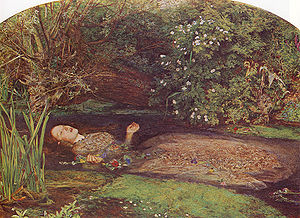Hogsmill River


The Hogsmill River flows through northern Surrey. It is a little river, six miles long, and one of the tributaries of the River Thames.
The Hogsmill rises in Ewell and flows into the Thames at Kingston upon Thames.
Course
The Hogsmill's source is a chalk spring at or near TQ219627 in Ewell in Surrey. It flows in a northerly direction through Old Malden, New Malden and Berrylands to the River Thames close to the centre of Kingston upon Thames at TQ177691 after a course of 6 miles. The river has a catchment area of 28 square miles.
The main river flows through much low-lying land, the majority of which is given over to sports grounds, until the final section through the built-up area of Kingston. A local council maintains the Hogsmill Open Space which follows the river until the outskirts of Kingston.
In Kingston, the river passes through the middle of the town, south of the town centre. The ancient coronation stone of Anglo-Saxon kings stands today above the course of the river. Soon afterwards, the river falls into the Thames.
Tributaries
Its principal tributary is the Bonesgate Stream, three miles in length, which rises south of Chessington to join the Hogsmill at Tolworth Court Bridge. Its other tributaries are:
- Surbiton Stream, 3.75 miles;
- Horton Stream, 3.3 miles;
- Greens Lane Stream, 1 mile;
- Ewell Court Stream, 1.7 mile;
- Hogsmill Stream, 0.3 mile.
Art

The Hogsmill has appeared in the art of Millais in his rendition of Ophelia;[1] though the play was set in Denmark and the model was painted while lying in a bath, the landscape was that of the Hogsmill River, near Ewell. Holman Hunt also used the Hogsmill in his work.[2]
Industry
The Hogsmill is known for watermills, reputed to have produced gunpowder for the Napoleonic Wars. Later, the waters were used to generate electricity for Ewell Court House[3]
Local Legend
William the Conqueror is said to have "watered his horse" in the source waters near today's Spring Hotel. Custom states this to be the pool at TQ218628.
Outside links

References
- ↑ Jason Rosenfield & Alison Smith Millais (Exhibition Catalogue) Tate Publishing 2007
- ↑ http://www.hogsmill.org/index.htm
- ↑ http://www.derek.phillips.ukonline.co.uk/ech&bridges.htm
- ↑ Kingston Borough Council - Plaque on the bridge